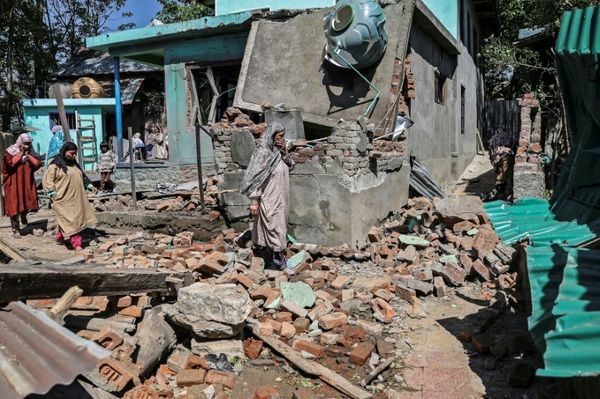
The first, and scariest, thing to note is how credible and relevant David Williamson’s scathing play about male brutality and oneupmanship remains, and how much we still have to learn from it.
The Removalists cracked something open in the Australian theatrical imagination when it premiered at La Mama back in 1971, and it seems to have lost none of its power to shock in the intervening decades. It’s a savage work, a curled lip and a bloodied fist, and Anne-Louise Sarks’ revival feels dangerously timely.
The set up is simple in many ways, but it retains a canny ability to swerve and startle throughout.
Simmonds (Steve Mouzakis) is a sergeant at an inner city cop shop, dealing with new recruit Ross (William McKenna), who “hasn’t been in the force for more than half an hour”. Simmonds is cut from familiar cloth: deeply misogynist, goading and corrupt. Ross is the play’s innocent, until he isn’t.
Into the station come two sisters, Kate (Jessica Clarke) and Fiona (Eloise Mignon). Kate is confident, even slightly haughty, while Fiona is submissive, jittery and hesitant. It transpires that Fiona has been beaten by her husband Kenny (Michael Whalley) and wants help getting her furniture out of the house while he’s out drinking. If the cops will supervise this furtive removalist’s job, there’ll be no need to press charges. What could possibly go wrong?
Sarks treats the work as a straightforward period piece while effortlessly drawing out its contemporary resonances, letting the often jaw-dropping chauvinism and sexual prejudice land with shuddering weight. The production is staged in traverse, with part of the audience up on stage staring back at us, reminding us that this is a play as much about witness as it is about violence itself. If the removalist (Martin Blum) allows the action to play out in front of him, so do we, silently implicated observers to barbarism and horror.
Mouzakis is the centre and engine of that horror, and he brilliantly navigates the role’s seemingly endless shades of depravity and menace. He nails the particular combination of jocularity and contempt that sits just under the surface of Australian mateship, drawling his syntax and thrusting his fists deeper and deeper into his pockets lest they punch open the whole world. He can explode in fury, but most of the time he’s an unctuous, snarling creep. The performance brings to mind Lear’s line about a dog being obeyed in office.
McKenna is strong as the morally compromised young officer whose face is as shiny as his shoes, but he doesn’t quite convince as the powder keg ready to blow; there’s something too decent and forthright about him for the character’s descent into outright savagery. Whalley is excellent as the husband who almost deserves his comeuppance, casually misogynistic and gleefully entitled, a portrait of toxic masculinity as divine right. Blum makes for an amusingly entrepreneurial removalist, a role originally played by Williamson himself.
The parts of the two women are trickier to steer because – while they arise from a place of compassion and respect from the playwright – they incline towards symbolism, if not quite caricature. Clarke makes Kate’s imperviousness feel completely valid, surrounded as she is by shoddy men, and Mignon is moving as a woman who still loves her abuser, but it’s hard to see them as fully rounded individuals. Williamson’s subsequent tendency to reduce his characters to mere mouthpieces is evidenced here, and the actors are often left with little to do.
Set designer Dale Ferguson does a terrific job evoking the prosaic tawdriness of the police station and the functionality of Fiona and Kenny’s home, lit with efficiency by Niklas Pajanti. Matilda Woodroofe’s costumes are smart and unobtrusive, underlining the overall approach of a production that could easily have stooped to a parody of the period. Sarks directs with considerable restraint and precision.
The Removalists is an important play rather than a truly great one. It lacks the internal architecture and logistical complexity of later Williamson works like The Club or Emerald City, and its tonal shifts, while arresting and frequently funny, are crudely handled. But it articulates something crucial in the Australian male psyche, something broken and unchecked.
It premiered in the same year as Ted Kotcheff’s Wake in Fright and, like that film, it paints a disturbing picture of brittle, brutal masculinity slugging it out for supremacy. If only that were a thing of the past.
The Removalists is at the Sumner Theatre, MTC Melbourne until 1 April







